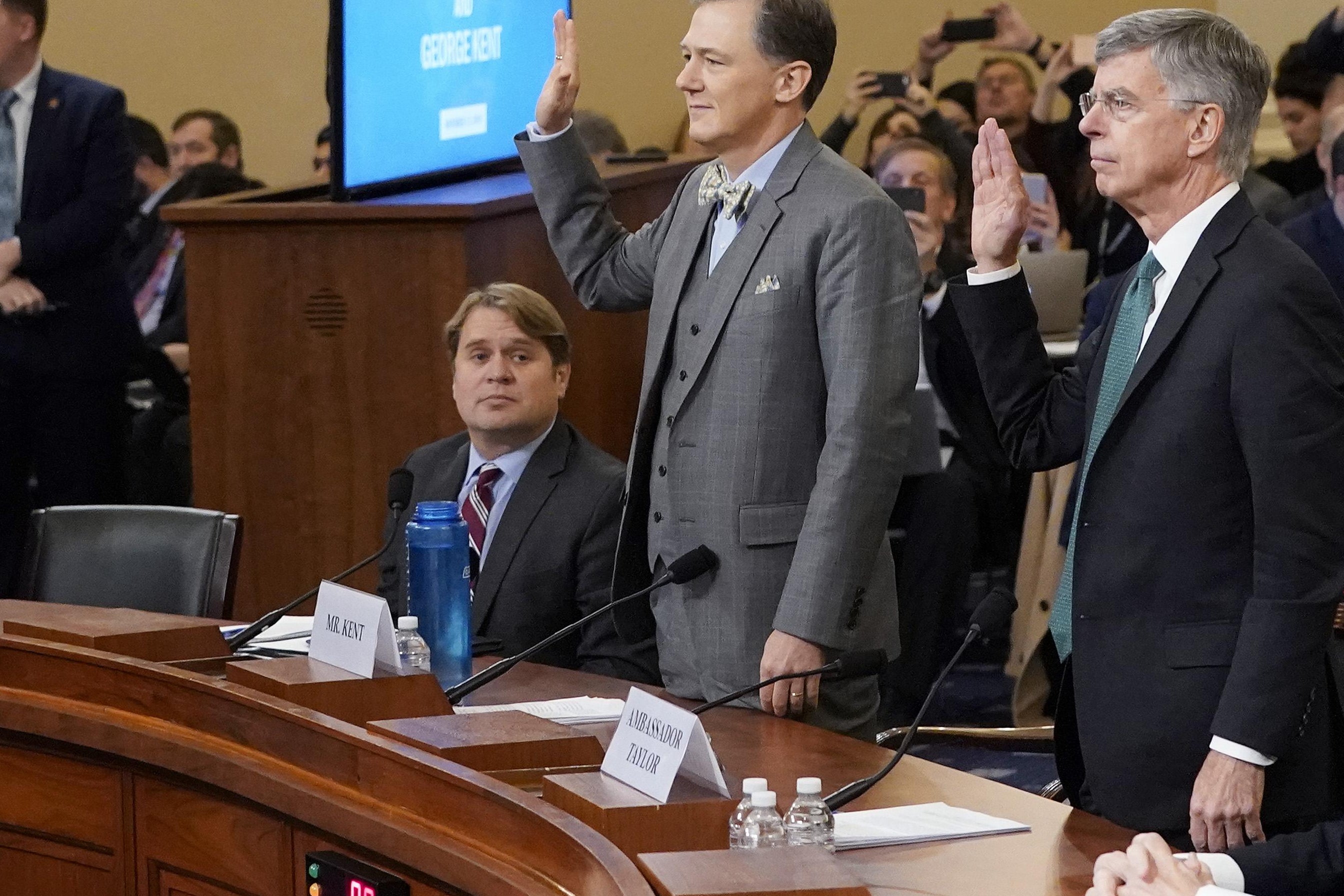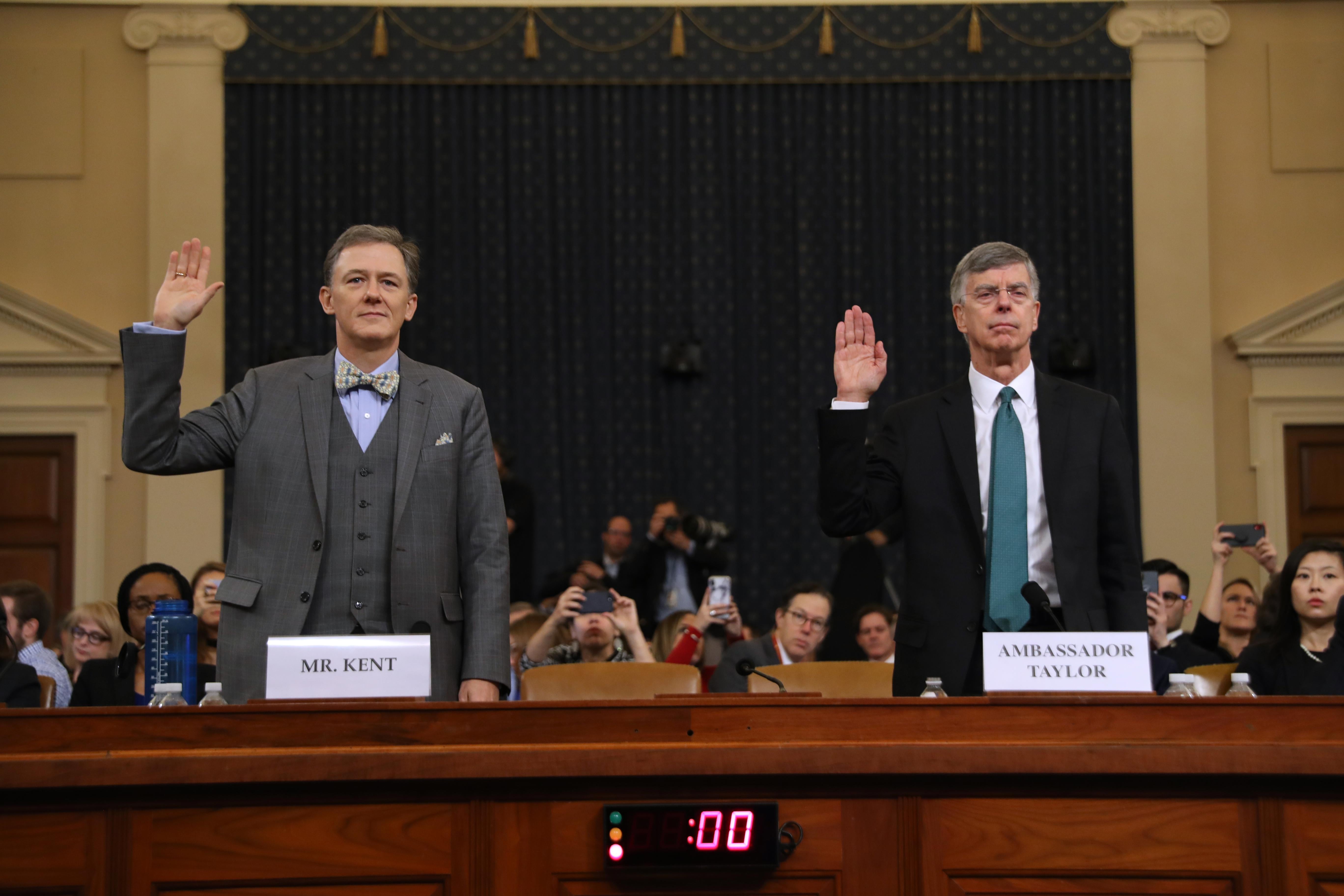During the first day of the public impeachment hearings, Ambassador Bill Taylor and State Department official George Kent appeared in a televised setting to inform lawmakers about the possibly corrupt behavior of President Donald Trump and his advisers in their dealings with Ukraine. They testified about grave concerns over the administration’s actions, including an apparent shadow agenda pursued by lawyer Rudy Giuliani and indications that Trump had conditioned essential military aid on the investigation of his own political rival.
Their appearance also raised a number of slightly less relevant questions.
Does George Kent always wear bow ties?
Unfortunately, no. A cursory search of Kent in Reuters photos and Google Images shows him wearing bow ties in most of his prominent appearances. There are, sadly, exceptions. But, on the bright side, one BuzzFeed employee discovered evidence of the importance of this particular bow tie (and matching pocket square). Long live this bow tie.
How many of Kent’s great-uncles served in World War II?
In his lengthy and arguably unfocused opening statement, Kent detailed his own family’s history in the civil service. If your attention began to slip as Kent listed his family’s credentials, fret not. Here’s the (clearly most important) segment of his opening statement.
I represent the third generation of my family to have chosen a career in public service and sworn the oath all U.S. public servants do, in defense of our Constitution. Indeed, there has been a George Kent sworn to defend the Constitution continuously for nearly 60 years, ever since my father reported to Annapolis for his plebe summer. After graduating first in his Naval Academy class in 1965, the year best known for his Heisman-winning classmate Roger Staubach, my father served a full 30 years, including as Captain of a nuclear ballistic missile submarine. Five great uncles served honorably in the Navy and in the Army in World War II. In particular, Tom Taggart was stationed in the Philippines at the time of the attack on Pearl Harbor; he survived the brutal Bataan Death March and three more years in a Japanese Prisoner of War camp, unbroken. He returned to service as an Air Force Judge Advocate, upholding the rule of law until his death in 1965.
So: five great-uncles.
Is Kyiv really pronounced kEEv?
Depends on who you are. It’s not totally wrong to pronounce it the way you probably already do, which is “Key-ev.” But that version hews closer to the Russian pronunciation. My colleague Mark Stern saw this firsthand when he visited last year. Ukrainians pronounce it “Keev,” so if you’re going for linguistic accuracy, that’s the way to go.
How do you “send a cable”?
Taylor testified that John Bolton, responding to Taylor’s concerns about the suspended military aid, told Taylor to “send a cable” to Secretary of State Mike Pompeo alerting him of those concerns. But it’s 2019, so what exactly does that mean?
As Slate noted in an Explainer in 2010, a diplomatic cable works essentially like a very official email, using a specific State Department messaging system. It differs from a normal email, though, in that relevant government departments and personnel sign off on it. It’s not just a personal message:
Cables… usually contain more important information that’s meant to be accessible to other diplomatic and military staff with the appropriate security clearance. As such, every electronic message that’s classified as a cable is uploaded into a database for permanent storage. When drafting a cable, a sender can specify where the information should be saved, depending on its sensitivity.
Does using “the” in “the Crimea” (as with “the Ukraine”) support Russian imperialism?
The recent prominence of Ukraine in our national consciousness has revived a linguistic conversation about the word “the.” But the arguments might not apply as neatly to Crimea.
Ukraine formally requested that the world drop the definitive article, as it served to reinforce the idea that Ukraine is a geographic region (like the South, for example) or a state that is also a geographic region (like the Bahamas, for example). But Ukraine is not a geographic region, and some believe that the use of “the” supports Russia’s effort to undermine Ukrainian statehood.
The same question could be asked of Crimea, another place that came up repeatedly in the hearing. Taylor and Kent were consistent in calling it just “Crimea,” no article. This appears to be consistent with most style guidelines. But Crimea is a peninsula, and even though Russia annexed it from Ukraine—something the international community has refused to recognize— the same logic would not necessarily carry over.
Would the gentlemen like a brief recess?
(Yes?)
Was Daniel Goldman, the Democrats’ impeachment lawyer, in a childhood carpool with a Slate contributor?
Yes. What Next: TBD host Lizzie O’Leary, who went to Sidwell Friends with Goldman, recalls that Danny S. (there was another Danny Goldman in her class who went by Danny H., she says) was “a super solid guy” and “the kind of person who is a good guy even in the 7th grade.”
Is that absurd drinking vessel in front of George Kent a normal-sized Nalgene water bottle?
No. According to Nalgene’s eager social media team, it is a 48-ounce WIDE MOUTH SILO. That’s a whole 16 ounces more than the standard water bottle. Good for Kent for being sustainable and staying hydrated.

Is Bill Taylor actually Walter Cronkite, risen from the dead?
You listen and tell me.
This post was updated throughout the hearing.
